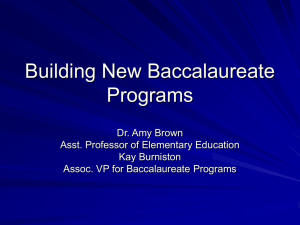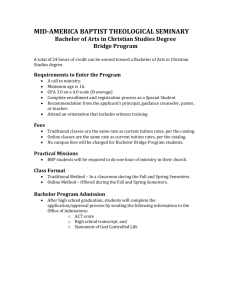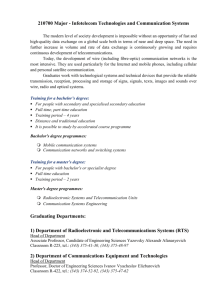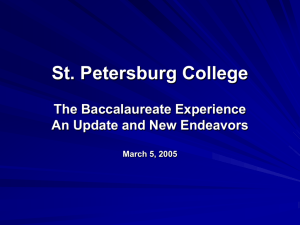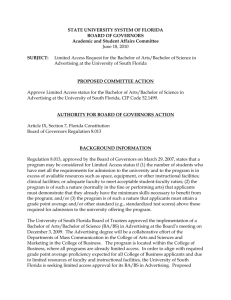St. Petersburg College - Higher Education Coordinating Council
advertisement
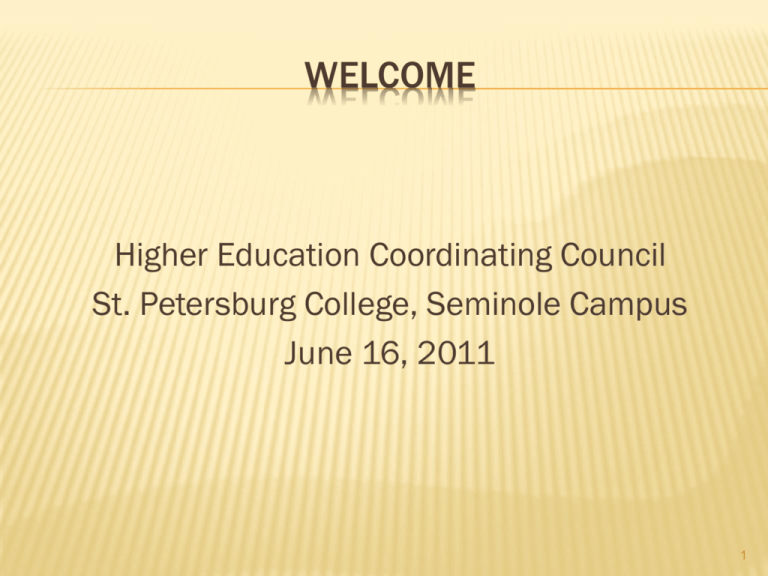
WELCOME Higher Education Coordinating Council St. Petersburg College, Seminole Campus June 16, 2011 1 The St. Petersburg College Story Pinellas Together 2 PARTNERSHIPS Community/Business Progress Energy, Raymond James Arts Palladium, Local Government Joint-Use American Stage Libraries Educational Entities USF, Eckerd College, Local School Districts 3 HISTORY – BACCALAUREATE ACCESS Challenges and Choices: The Master Plan for Postsecondary Education 1998 Florida’s 46th out of 50 states producing bachelor’s degrees (NCHEMS-1998) Pinellas 67 of 67 counties in Baccalaureate access Senate Bill 1162 passed 2001 Established St. Petersburg College $1 Million appropriation 4 OVERVIEW - ACTION Solution: branch campuses; partnerships; community college baccalaureate Online Education 5 OVERVIEW - BACCALAUREATE RN to BSN Nursing Technology Management Teacher Education Elementary Education Exceptional Education Secondary Mathematics Secondary Science 6 NEW PROGRAM APPROVAL Needs Assessment Employer/Student Survey Job Projections (local; statewide) Labor Market Analysis (High Need/High Wage Areas) Cost of Program Proposed Campus Location Projected Enrollment Program Description Discussion with University of South Florida Dr. Bob Sullins, Dean Undergraduate Studies Developing A Curriculum Process (DACUM) District Board of Trustees’ Approval 7 CURRENT SPC BACCALAUREATE OFFERINGS College of Business BAS in Public Safety Admin College of Health Sciences ◦ ◦ School of Veterinary Technology BAS in Technology & Management ◦ BAS in Veterinary Technology College of Policy and Legal Studies ◦ ◦ BAS in Paralegal Studies BS in Public Policy and Admin Department of Natural Science ◦ BS in Biology Certificate Options College of Nursing ◦ College of Computer and Information Technology College of Public Safety Admin BAS in Dental Hygiene BAS in Health Services Admin BAS in Orthotics & Prosthetics BS in Business Administration BAS in International Business BAS in Banking BAS in Mgmt & Org. Leadership BAS in Sustainability Mgmt BS in Nursing College of Education BS in Elementary Education BS in Exceptional Education BS in Sec & Middle Mathematics BS in Sec & Middle Science BS in Business Technology BS in Technology Education BS in Educational Studies Alternative Teacher Education Options ◦ 8 STUDENT DEMOGRAPHIC SUMMARY 71.3 female and 28.7 male 75.9% white, 19.7% non-white, and 4.4% unknown 95.2% in-state 67.7% part-time Average age is 34.4 Associate’s Level 27.2 9 FTE GROWTH 2500 Initial FTE Goal 2396 2000 2055 1677 1500 1415 1185 1000 974 725 500 0 543 195 2002-2003 2003-2004 2004-2005 2005-2006 2006-2007 2007-2008 2008-2009 2009-2010 2010-2011* *Projected 10 BACCALAUREATE ENROLLMENT GROWTH Historic SPC Upper Division Headcount 6000 5856 5000 5141 4000 4122 3262 3000 2701 2000 2098 1530 1000 1067 621 0 2002-2003 2003-2004 2004-2005 2005-2006 2006-2007 2007-2008 2008-2009 2009-2010 2010-2011 11 HIGHLIGHTS UNDUPLICATED HEADCOUNT 2010-11 unduplicated headcount grew to over 5800 students (a 12% increase from 0910) College of Education served more than 1270 students College of Technology & Management (Business) served nearly 1350 students BSN grew to nearly 1000 students 12 GRADUATES 4,418 Total Graduates 1100 1000 1008 900 846 800 739 700 600 617 500 516 400 341 300 200 100 224 127 0 2003-2004 2004-2005 2005-2006 2006-2007 2007-2008 2008-2009 2009-2010 2010-2011 13 GRADUATION HISTORY Since the inception of SPC’s Baccalaureate programs, there have been over 4400 graduates. From the three initial programs we graduated 1460 new teachers Over 900 BSN prepared nurses Over 580 from the College of Technology & Management 14 STATE COLLEGE COMPARISON Percentage of Total Upper Division Students Served by Florida State Colleges in 2009-2010 12,464 Total Students Served 50% 40% 36% 30% 20% 10% 18% 9% 8% 7% 0% Data taken from 2011 State Factbook Table 2.3.2T 6% 5% 3% 3% 2% 1% 1% 0% 0% 15 KEYS TO QUALITY SUS academic policies Statewide Course Numbering System (SCNS) Classification of Instructional Programs (CIP) 120 Credit Hour Policy Common Pre-Requisite Manual General Education Requirements Including Foreign Language Specialized accreditation Annual Report on Accountability Measures (DOE) Enrollment Degree Production Student Access and Progression Student Achievement Close Consultation and Involvement of Business and Community Summative Field Experiences Local Board of Trustees’ Control 16 SPECIALIZED ACCREDITATION BS Education Florida Department of Education The National Council for Accreditation of Teacher Education BAS Orthotics and Prosthetics Commission on Accreditation of Allied Health Education Programs National Commission on Orthotics and Prosthetics Education BS Nursing Commission on Collegiate Nursing Education BAS Veterinary Technology American Veterinary Medical Association BAS Paralegal American Bar Association College of Business Accreditation Council for Business Schools and Programs 17 BACCALAUREATE FACULTY 53 Fulltime Faculty 82% Terminally Prepared SACS Requirement - At least 25 percent of the discipline course hours in each undergraduate major are taught by faculty members holding the terminal degree—usually the earned doctorate—in the discipline. “One College” Commitment Teaching Focus 18 END OF PROGRAM EXPERIENCE Capstone Business Plan – Synthesizes comprehensive business knowledge and application Simulation – Students compete by managing their global company Process Improvement – Students identify workplace practice needing re-engineering Leadership Practicum – Students focus on practical managerial issues for improvement Field Experience All semesters College of Education students are required to complete school-based experiences. Final 16-week internships. 19 END OF PROGRAM EXPERIENCE Advisory Board – 5-25 business and community professionals Curriculum Input Co-op Work Experience Capstone Presentation Video (advance to next slide / must be connected to the Internet) 20 21 FINANCE FORMULA Tuition less than SUS, more than tuition in our 2-year programs. Tuition per Credit 2010-11 SPC 2yr = $94.08 SPC 4yr = $101.73 University South Florida (Tampa) = $175.80 University South Florida (St. Pete) = $154.00 22 Comparison of Average Costs for a Baccalaureate Degree in Florida (120 Credit Hours based on 2009-10 tuition and state funding levels) State Support $100,000 Florida Resident Access Grant Student Tuition $86,395 $90,000 $80,000 $70,000 $60,000 $52,907 $46,549 $50,000 $76,279 $40,000 $32,984 $11,698 $42,131 $30,000 $18,034 $9,840 $20,000 $34,851 $8,488 $10,000 $23,144 $9,546 $Florida College System 2+2 Baccalaureate Degree FCS + SUS 2+2 Baccalaureate Degree State University System 4-year Baccalaureate Degree $5,058 $5,718 $10,116 FCS + ICUF 2+2 Baccalaureate Degree ICUF 4-year Baccalaureate Degree 23 Ms. Catherine Kennedy, Associate Vice President UNIVERSITY PARTNERSHIP CENTER UNIVERSITY PARTNERSHIP CENTER (UPC) + SPC funded to provide support: Partners provide direct instruction 16 Partners public/private example:2+4 with University of Florida-Pharmacy 31 Bachelor’s degree programs 34 Master’s and Doctoral programs 2,275 students currently enrolled 25 CURRENT SPC UPC DEGREE OFFERINGSPART 1 Barry University Bachelor of Science in Public Administration Bachelor of Science in Administration Bachelor of Science in Professional Studies Human Resources Specialization Bachelor of Science in Professional Studies Health Services Administration Specialization Bachelor of Science in Exercise Science Bachelor of Science in Sport Management Master of Clinical Medical Science - Physician Assistant Master of Science in Exercise Science Master of Science in Sport Management Master of Public Administration (MPA) Master of Science in Health Services Administration Master of science in Health Services Administration/Master in Public Health — Dual Degree Master of Arts in Administration (MAA) Dr. of Philosophy in Leadership and Education Specialization in Higher Education Administration Case Western Reserve University Doctor of Nursing Practice Cleveland State University Master of Science in Nursing Eckerd College Bachelor of Arts in American Studies Bachelor of Arts in Business Management Bachelor of Arts in Human Development Bachelor of Arts in Visual Arts Embry Riddle Aeronautical University Bachelor of Science in Technical Management Bachelor of Science in Professional Aeronautics Master of Aeronautical Science Master of Science in Management Florida A&M University Bachelor of Science in Electronic Engineering Technology Bachelor of Science in Construction Engineering Technology Florida Gulf Coast University Bachelor of Science in Criminal Justice Bachelor of Science in Legal Studies Bachelor of Science in Health Sciences Master of Science in Health Sciences Master of Public Administration CURRENT SPC UPC DEGREE OFFERINGSPART 2 Florida Institute of Technology Master of Science Acquisition & Contract Mgmt Master of Science in Human Resource Mgmt Master of Science in Logistics Management Master of Science in Management/Transportation Management Florida State University Bachelor of Science in Computer Science Bachelor of Science in Visual Disabilities Master of Science in Criminology/Criminal Justice Studies Master of Science in Educational Leadership Master of Business Administration Master of Science in Management Information Systems Master of Science in Risk Management/Insurance Master of Science in Visual Disabilities National University of Health Sciences Doctor of Chiropractic Medicine Saint Leo University Bachelor of Arts in Business Administration Bachelor of Arts in Psychology University of Florida Bachelor of Science in Business Administration Doctor of Dentistry –Residency and CE Doctor of Pharmacy University of South Florida-Tampa Master of Arts in Criminal Justice Administration Master of Arts in Adult Education Master of Arts in in Library and Information Science Master of Science in Nursing Education Master of Social Work Master of Education in Instructional Technology Education Specialist in Instructional Technology Professional Science Master’s Biotechnology University of South Florida-St. Petersburg Bachelor of Arts/Bachelor of Science in Business Administration Master of Business Administration (MBA) UPC PARTNERS University of Florida – Pharmacy Barry University – Physician Assistant Mr. Ken Gonzalez, Assistant Director National University of Health Science – Chiropractic Medicine Ms. Terry Helopoulos, Operations Director St. Leo University - Psychology and Business Administration Dr. Jennifer Williams, Assistant Dean Dr. Joe Stiefel, Dean University of South Florida – St. Petersburg Dr. Margaret Sullivan, Regional Chancellor 28 K-12 PARTNERSHIP INITIATIVES Collegiate High School Early College Program and Dual Enrollment Gibbs High School Initiative 29 Ms. Starla Metz, Principal COLLEGIATE HIGH SCHOOL SPCHS OVERVIEW SPCHS opened in 2004 as a public charter school operated by SPC and sponsored by Pinellas County Schools. Mission The mission of SPCHS is to provide students with an enriched learning environment where they can simultaneously earn a high school diploma, an Associate in Arts degree, and qualify for Bright Futures scholarship. Combines high school experiences with college academics Pre-Collegiate and Collegiate Programs The Pre-Collegiate Program prepares 10th grade students for success in college-level courses. The Collegiate Program supports 11th and 12th grade students who are dually enrolled in college coursework leading to completion of the requirements for an A.A. degree. 25 SPCHS ENTRANCE CRITERIA Pre-Collegiate Program Preferred GPA of 2.5 or higher Preferred scores of 60-65 on CPT Random lottery selection process Usually 2-3 students for each opening Collegiate Program Passing scores on the CPT Unweighted GPA of 3.0 or higher Random lottery selection process 32 DEMOGRAPHICS OF SPCHS 2010-11 10th 11th 12th Total % Male 29 24 43 96 45% Female 32 46 37 115 55% 61 70 80 211 42 51 60 153 73% 8 6 6 20 9% *Hispanic 6 8 9 23 11% *Asian *Native American Free/reduced 7 9 6 22 10% 3 2 1 6 2% 14 14 16 44 21% Total Students 61 70 80 211 Total White nonHispanic Black *Students may be counted in more than one category by PCS data system. 33 SPCHS OUTCOMES FCAT Scores 2011 FCAT ResultsHigh School Percentage of Students Passing Percentage of Students Passing Percentage of Students Level 4 - 6 Percentage of Students Level 3-5 School/District/State Math Reading Writing Science St. Petersburg Collegiate 100 95 93 78 East Lake 93 78 90 55 Lakewood 66 52 70 38 Osceola High 93 72 87 44 Palm Harbor University 96 86 86 66 District 81 59 76 39 State 82 60 75 40 34 SPCHS OUTCOMES Graduation Data Academic Year Total Number of Seniors H.S. Graduation Rate A.A. Graduation Rate 2010-11 81 99%* 95%* 2009-10 60 98% 98% 2008-09 59 100% 97% 2007-08 54 98% 80% 2006-07 58 100% 84% 35 Dr. Jeff Cesta, Director EARLY COLLEGE PROGRAM AND DUAL ENROLLMENT EARLY COLLEGE PROGRAM Juniors can receive a high school diploma and an A.A. degree after meeting all of the graduation requirements. Early College students are eligible to participate in the athletics and activities of their assigned high school. Students will enroll in 15+ credit hours (5 college-level courses) each term leading to both a high school diploma and an A.A. degree. Students will be required to attend weekly academic support seminars facilitated by the Teacher/Academic Coach. This course earns .5 high school credit per semester. 37 ECP STUDENT ENROLLMENT 400 375 375 2009-2010 2010-2011 350 300 270 250 200 150 96 100 50 0 Total ECP Student Enrollment 2007-2008 2008-2009 ECP AVERAGE GPA 3.4 3.36 3.3 3.24 3.24 2010 2011 3.2 3.1 3 3.01 2.9 2.8 2008 2009 ECP GRADUATION RATE 2009 – 92% 2010 – 91% 2011 – 93% 40 DUAL ENROLLMENT TRENDS 35,000 30,000 30,067 25,000 20,000 Headcount SSH 15,000 12,411 10,000 5,000 2,450 1,553 0 2005-06 2006-07 2007-08 2008-09 2009-10 2010-11 Dr. Bill Law, SPC President Mr. Kevin Gordon, Principal GIBBS HIGH SCHOOL INITIATIVE GIBBS HIGH SCHOOL INITIATIVE Faculty Support Training Mentoring Student Support Early CPT Testing Career Advisors Community Involvement Pre-K and Post Secondary Connection Parent Engagement Parent Academy 43 IMPEDIMENTS TO PARTNERSHIPS 2+2 scholarship limited to state colleges/universities and face to face programs Capital Outlay PECO Funding does not recognize partnerships 44 QUESTIONS/COMMENTS 45

